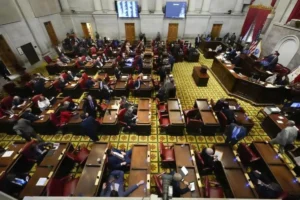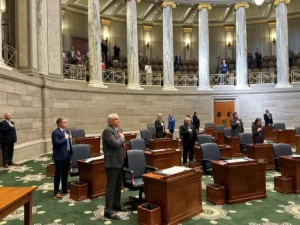Introduction: America’s Political Culture
In America’s political culture, taking oaths and pledges has always been a big deal. It’s like a symbolic promise that elected officials make to follow the Constitution. But lately, things have been changing. Some politicians are saying no to these oaths, especially when it comes to hot-button topics like abortion and gun control. This shift shows how divided our political landscape has become and how it’s shaking up the old ways of doing things in politics.
Sabrina Warner’s Resignation Announcement
“I can’t continue supporting Ohio’s new constitution under the oath,” expressed Sabrina Warner in her resignation letter from the state’s Republican central committee. Her decision came shortly after Ohio voters ratified an amendment in November, guaranteeing access to diverse reproductive health services, including abortion. This vote marked a triumph for many, countering the Supreme Court’s 2022 decision to revoke abortion rights. Warner, staunchly anti-abortion, found herself unable to align with Ohio’s constitution, which she had proudly pledged to uphold a year prior, reflecting a shift in the political culture.
Oaths in America’s Political Culture
Recently, American elected officials have routinely taken oaths and pledged allegiance to uphold the Constitution with minimal controversy. However, this tradition has shifted amidst contentious debates on issues like abortion, gun control, and minority rights. Some political leaders, such as Missouri Secretary of State Jay Ashcroft, now challenge this tradition, hinting at amendments to include abortion rights in state constitutions, signaling a change in political culture.
Last fall, Ohio’s reservations on certain issues came to the fore, prompting legal experts to propose a ballot initiative for this year. Following Ohio’s vote, Warner’s resignation letter, effective just two days later, was notably emphatic. Filled with biblical references, she condemned those she disagreed with as “cowardly, disrespectful, murderous,” likening them to “being thrown into the lake of burning sulfur.” Despite the intensity of her statements, she did not retract or clarify them. This episode highlights the changing political culture in Ohio.
Democratic Rep. Jones’ Refusal

In Tennessee, Democratic Representative Justin Jones made a significant decision during a legislative session by declining to lead the oath. His choice followed a series of events last year when he and two other Democrats, including two black lawmakers, were temporarily expelled from the statehouse. This occurred after they participated in a demonstration outside the chamber, which angered GOP members due to rule violations. Jones’ refusal came amidst criticism from Republican colleagues, who accused him of being racist and diverting attention from critical issues such as gun control. This incident highlights the complexities within Tennessee’s political culture.
Republican Reaction to Refusal
When another Democratic lawmaker, a military veteran, chose not to weigh in on Jones’ refusal to take the oath, Republicans quickly voiced their frustration and disappointment with Jones’ decision. GOP representative Jeremy Faison went as far as labeling Jones’ denial as “disgraceful.” Faison expressed his opinion that Jones should resign, considering it a disservice to veterans and previous generations. Jones later rebutted Republican criticism by suggesting that their support for those opposing the president undermines the principles of freedom and justice for all, highlighting the deep divisions within the political culture.
Historical Similarity in Stance
Jones’s stance mirrored a similar event involving Tennessee Representative Henry Brooks in 2001, where he faced repercussions for refusing to take the oath alongside his white colleagues. Brooks, an African American, cited his objection since childhood, viewing the American flag as a symbol of oppression. Similarly, earlier this year, former President Donald Trump declined to sign the loyalty oath in Illinois, a tradition stemming from the McCarthy era. These incidents underscore the complexities of political culture and diverse perspectives on oath-taking and allegiance.
Trump’s decision not to sign the oath, without explanation, highlights the expectations for candidates to uphold democratic principles and the rule of law. Knowing that he took the oath in both 2016 and 2020, Trump’s choice to abstain from taking it once more calls into doubt his dedication to these principles. This shows how complex the political culture around taking an oath and following constitutional norms may be as he deals with legal issues in the aftermath of the Capitol attack on January 6, 2021.
Trump’s Oath Reiteration

While Steve Cheung, the spokesperson for President Trump, remained silent on the matter, he assured everyone earlier this year that Trump plans to retake the oath of office in 2025 and that he will carry out his duties with unwavering devotion to the Constitution. This highlights the significance of taking an oath in our political culture as a real commitment to sustaining the values of governance. Refusing the oath can have serious consequences for elected officials, highlighting the significance of this tradition in our democracy.
Ashcroft’s Abortion Allegiance Concern
In Missouri, Jay Ashcroft made waves in October when he stated that voters would reject swearing allegiance to the governor’s office if abortion rights were upheld in the state constitution. He emphasized the solemn duty officials have to protect and defend both the U.S. and Missouri constitutions when taking office. This highlights how oath-taking is a crucial aspect of our political culture, representing elected officials’ pledges to uphold core principles of governance. It also reflects historical significance, evident in cases like Dobbs, which challenged precedents like Roe v. Wade, sparking debates on constitutional rights interpretation and application.
Foundation’s Abortion Legal Argument
The Foundation advocated ending abortion, stressing the Supreme Court’s role in public perception of the Constitution. They argued that officials, bound by oath, must respect court rulings aligned with constitutional principles. This highlights the interplay of legal decisions, civic duty, and political culture in the reproductive rights debate.
Chris Redfern contrasted Republican concerns over abortion rights with past Democratic positions on divisive issues. Reflecting on his tenure as Ohio Democratic Party chairman in 2005, Redfern noted opponents of a same-sex marriage ban remained steadfast in their oath. He lamented a shift in political culture, citing a decline in seriousness about constitutional principles, particularly amid Trump-era polarization. Redfern suggested partisan divisions may have weakened lawmakers’ commitment to upholding constitutional values, despite regular oath-taking.
Conclusion
In summary, the changes we’re witnessing in the realm of oaths and pledges mirror the profound transformations occurring within American political culture, especially amidst the polarization characterizing today’s era. With more political figures challenging the conventional practices of oath-taking, it highlights the deeper ideological divides and contentious topics shaping our political landscape. In the future, the dynamics around oaths and pledges will continue to be significant indicators of how our political culture develops and adjusts to new standards.
FAQs
- Why do elected officials pledge and take oaths?
Ans: To demonstrate their dedication to preserving the fundamental values of the Constitution, politicians take oaths and make promises.
- What is causing a change in the tradition of oath-taking?
Ans: The shift is driven by ideological differences, especially on divisive topics like abortion rights and gun control, which are challenging traditional practices.
- Are all politicians still following the tradition of oath-taking?
Ans: No, some politicians are now opting out or questioning the oath-taking process.
- What does the shift in oath-taking signify?
Ans: It reflects deeper ideological divisions and disrupts established norms in the political sphere.
- How will oath-taking evolve in the future?
Ans: Oath-taking will continue to reflect changes in political attitudes and norms, indicating the evolving political culture in America.
More info: Three Republican Chairs Announce Retirement